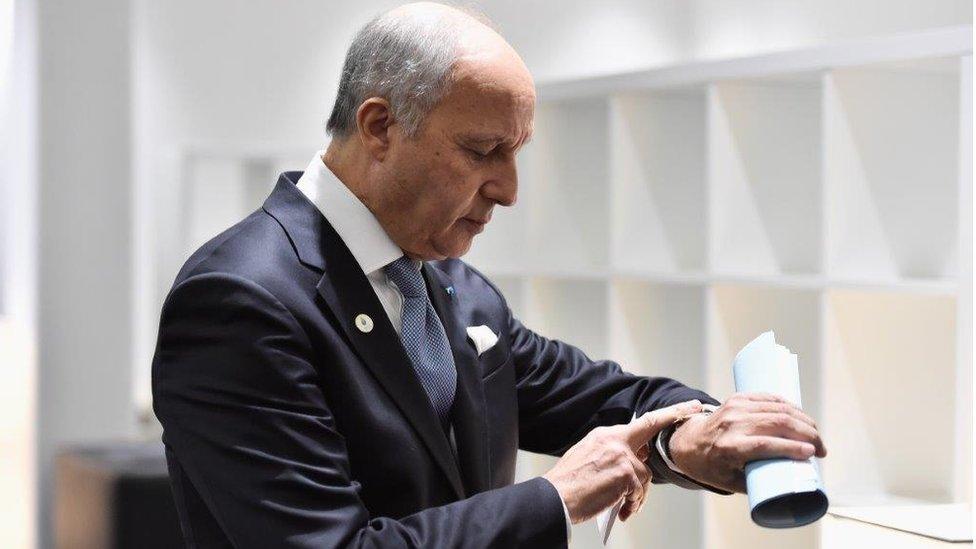COP21: Will it be absolutely Fabius in Paris?
- Published
- comments

French foreign minister Laurent Fabius is insisting the climate conference will finish on time
As ministers arrive and this conference enters its final week, two big questions remain.
Can the politicians seal a deal that will have long-term implications for the health of the planet - and can the French change their hard-earned reputation for grumpiness on an epic scale?
It has to be said that at least on this second question, things are looking very good indeed.
Everywhere you go in this sprawling international village built in the gritty suburb of Le Bourget, you find smiles on granite-faced security guards, cheery "bonjours!" and, get this, they even ask if you want milk in your tea when you order a cup!
At the Le Bourget station, you find some of the hundreds of underprivileged teenagers recruited from the local neighbourhoods to meet and greet the thousands who come to COP21 via the train every day.
They have been specially trained with lessons in English and attitude. They are doing a great job.
But the key to the success of this COP will not be found in the sparkling toilets (they really do!) or in the friendly smiles.
The vital ingredient in the Paris deal lies in the personality of the French foreign minister Laurent Fabius, who is the president of the Conference of the Parties, the man tasked with steering this meeting to a successful outcome.
Velvet and steel
This imperious diplomat has been a serious global player for decades. He glides through rooms with the confident air of a man well used to power.
Like a stern but respected headmaster, Fab is patient and listens to all. But you sense there is real steel underneath, if required.
The COP seems a little bit scared of him. Most of the deadlines he has insisted upon have so far been met. Very unlike the UN!
And unlike Copenhagen, when Prime Minister Lars Lokke Rasmussen seemed at sea with the details and the conventions of this process, Fabius exudes knowledge and respect.
Addressing the plenary session on Saturday, he took a moment to speak "personally".
"As all of you know I have fairly broad experience in public life, but this is something special, this agreement is something we just cannot postpone," he told the negotiators.
"What we are discussing is not only the climate, not only the environment - we are talking about life itself.
"I intend to muster the experience of my entire life at the service of success for next Friday. It is not the question of the presidency on one side and you on the other; we all have to be moving in the same direction."
His comments were greeted with sustained applause.
French charm
There is no doubt that Fabius and his boss, President Francois Hollande, will try their utmost to deliver a deal.
French diplomats have traversed the world, in huge numbers in the past 12 months, meeting national leaders to try to understand their key issues.
In his speech of welcome to world leaders last Monday, Hollande showed the benefits of this diplomatic outreach.
He used some "magic phrases" that have huge significance, especially for developing nations.
He was, he said, speaking in the name of "climate justice", and "in the name of climate justice we must act!"
An agreement must be universal, differentiated, and binding, he said. There needs to be "a credible path to limit global warming below 2C, or 1.5C if possible," he said.
"Developed countries must take their historic responsibilities; they are the ones who for years emitted the largest amounts of greenhouse gases. Emerging countries must accelerate their energy transition, and developing countries must be supported in adapting to the impacts of climate change."
Approaching deadline
Hollande has gone further than any leader of a developed country in reassuring the developing world that they will not be tricked into an unfair deal that will restrict their growth and saddle them with huge loans masquerading as climate finance.
And in Fabius he has the ideal man to drive the Paris agreement over the finish line.
The COP president will be able to look ministers in the eye this week, as a vastly experienced equal, and nudge, charm or chastise them to a deal.
It could all fall apart, undoubtedly. This is the UN after all.
However, Fabius keeps insisting that everything will be wrapped up by Thursday to allow time for translations and revisions. The whole deal is to be signed, sealed and delivered by 6pm on Friday!
Who knows, President Fabius may save the world and still be home in time for his tea!

UN climate conference 30 Nov - 11 Dec 2015

COP 21 - the 21st session of the Conference of the Parties - will see more than 190 nations gather in Paris to discuss a possible new global agreement on climate change, aimed at reducing greenhouse gas emissions to avoid the threat of dangerous warming due to human activities.
Explained: What is climate change?
In video: Why does the Paris conference matter?
More: BBC News climate change special report

Follow Matt on Twitter @mattmcgrathbbc, external.